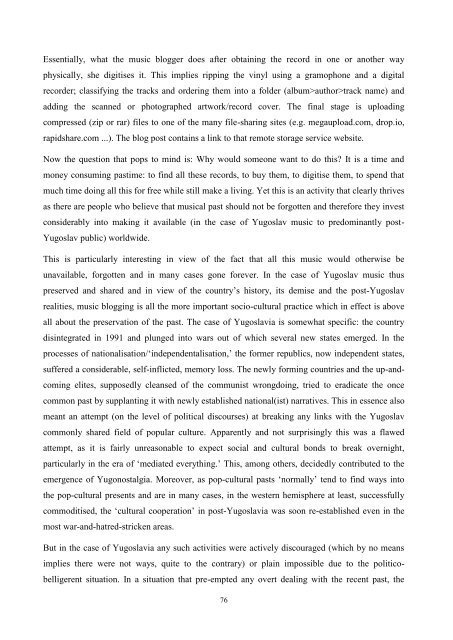UNIVERSITY OF NOVA GORICA GRADUATE SCHOOL ...
UNIVERSITY OF NOVA GORICA GRADUATE SCHOOL ...
UNIVERSITY OF NOVA GORICA GRADUATE SCHOOL ...
Create successful ePaper yourself
Turn your PDF publications into a flip-book with our unique Google optimized e-Paper software.
Essentially, what the music blogger does after obtaining the record in one or another way<br />
physically, she digitises it. This implies ripping the vinyl using a gramophone and a digital<br />
recorder; classifying the tracks and ordering them into a folder (album>author>track name) and<br />
adding the scanned or photographed artwork/record cover. The final stage is uploading<br />
compressed (zip or rar) files to one of the many file-sharing sites (e.g. megaupload.com, drop.io,<br />
rapidshare.com ...). The blog post contains a link to that remote storage service website.<br />
Now the question that pops to mind is: Why would someone want to do this? It is a time and<br />
money consuming pastime: to find all these records, to buy them, to digitise them, to spend that<br />
much time doing all this for free while still make a living. Yet this is an activity that clearly thrives<br />
as there are people who believe that musical past should not be forgotten and therefore they invest<br />
considerably into making it available (in the case of Yugoslav music to predominantly post-<br />
Yugoslav public) worldwide.<br />
This is particularly interesting in view of the fact that all this music would otherwise be<br />
unavailable, forgotten and in many cases gone forever. In the case of Yugoslav music thus<br />
preserved and shared and in view of the country‘s history, its demise and the post-Yugoslav<br />
realities, music blogging is all the more important socio-cultural practice which in effect is above<br />
all about the preservation of the past. The case of Yugoslavia is somewhat specific: the country<br />
disintegrated in 1991 and plunged into wars out of which several new states emerged. In the<br />
processes of nationalisation/‗independentalisation,‘ the former republics, now independent states,<br />
suffered a considerable, self-inflicted, memory loss. The newly forming countries and the up-andcoming<br />
elites, supposedly cleansed of the communist wrongdoing, tried to eradicate the once<br />
common past by supplanting it with newly established national(ist) narratives. This in essence also<br />
meant an attempt (on the level of political discourses) at breaking any links with the Yugoslav<br />
commonly shared field of popular culture. Apparently and not surprisingly this was a flawed<br />
attempt, as it is fairly unreasonable to expect social and cultural bonds to break overnight,<br />
particularly in the era of ‗mediated everything.‘ This, among others, decidedly contributed to the<br />
emergence of Yugonostalgia. Moreover, as pop-cultural pasts ‗normally‘ tend to find ways into<br />
the pop-cultural presents and are in many cases, in the western hemisphere at least, successfully<br />
commoditised, the ‗cultural cooperation‘ in post-Yugoslavia was soon re-established even in the<br />
most war-and-hatred-stricken areas.<br />
But in the case of Yugoslavia any such activities were actively discouraged (which by no means<br />
implies there were not ways, quite to the contrary) or plain impossible due to the politicobelligerent<br />
situation. In a situation that pre-empted any overt dealing with the recent past, the<br />
76

















